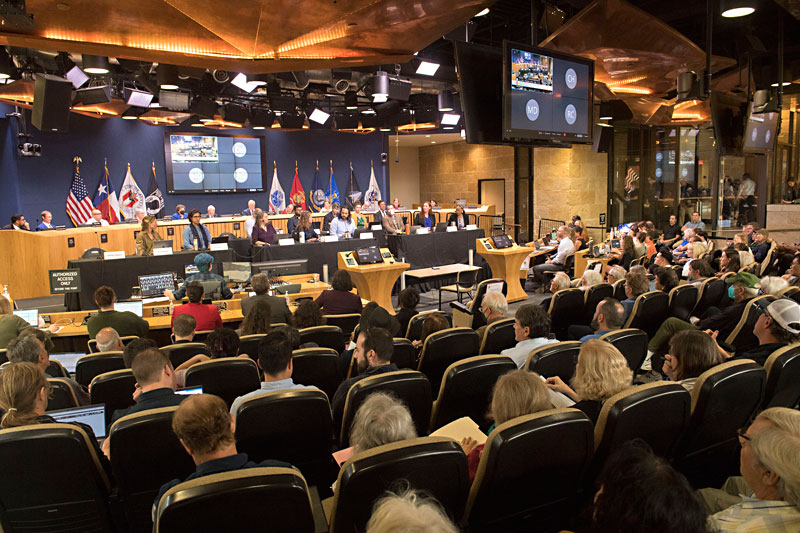Young Parents, UT Students Support Zoning Changes at Historic Meeting
The renting generations
By Lina Fisher, Fri., Nov. 3, 2023

At the first-ever joint meeting of the Planning Commission and City Council last Thursday, hundreds of Austinites came out to support the most significant changes to the city's housing policies in recent memory. After seven hours of testimony from almost 400 speakers, it was clear that more spoke in support of the proposed changes than against them, and that the divide was generational.
Council Member Leslie Pool's HOME initiative (Home Options for Middle-Income Empowerment), first proposed in July, includes a big change to the land development code: rezoning all single-family (SF) lots to include up to three units. Two other changes up for consideration come from June and September Council resolutions, respectively: permitting the use of tiny homes on SF lots, and eliminating occupancy limits (how many unrelated adults can live in one unit). This hearing was the first of three public meetings at which Austinites can give their input. Next up is the Nov. 14 Planning Commission meeting. Council will discuss the changes again at a Nov. 28 work session and is scheduled to vote on the changes Dec. 7. There's also an open house with staff this coming Monday, Nov. 6, from 6-8pm at the Central Library.
We have A FAR way to go
The hearing began with a presentation from staff, which noted that since 2010, the city has gained roughly 66,000 more new jobs than new housing units. Last year, there were 1.31 jobs for every housing unit, reflecting many Austinites' reality of long commutes from homes outside the city. For comparison, less expensive cities such as Houston and Raleigh have a 1-1 ratio; New York, San Francisco, and other expensive metros have ratios of 2-1 or greater. Further, the percentage of multi-unit housing has decreased since 2010 as our population has boomed.
Staff also referenced an analysis done by the city's housing department which pointed out how elements of the HOME initiative could encourage development of expensive homes. For duplexes and triplexes, the current proposal eliminates McMansion standards – which include floor-to-area ratio limits – without making minimum lot sizes smaller, or encouraging preservation of existing homes. That would allow for three stories of new 1,100-square-foot units, which "may result in units with similar size and price to current single-unit uses, which would not achieve [the resolution's] goal of facilitating the availability of 'smaller, more diverse housing types' for middle-income households," the staff analysis says. The analysis also pointed out that these changes could lead to higher rent for single-family homes, as the potential to build more expensive housing could increase property value, which in turn would increase landlords' taxes. Incentives to preserve an existing structure while adding attached units, or bringing back McMansion standards for multi-unit development, could ensure the new housing would be more accessible to middle-income families.
The day before the meeting, Pool's office posted to the Council message board suggesting similar reworks, including "a Floor-to-Area (FAR) limit" and "a meaningful preservation incentive that is accessible to homeowners. Existing homes have inherent value and keeping those materials out of the landfill is environmentally sustainable."
Before public comment began, planning commissioners and Council Member Alison Alter had questions for staff about McMansion standards. Planning Commissioner Jennifer Mushtaler flagged another common concern: whether existing infrastructure such as sewage and water lines are set up to handle the new development (the staff presentation indicated that infrastructure would be addressed in phase two of the proposed changes). City Manager Jesús Garza recommended punting specific questions to staff later on so as to get to the point of the hearing: input from the public.
Two Environmental views
At the beginning, many homeowners voiced their concerns about rising property taxes and neighborhood character, as well as the aforementioned infrastructure concerns, plus the possibility of increased impervious cover worsening flood risks. As the meeting wore on past work hours, however, the tenor of comments started to change. Many young parents brought toddlers with them to the podium, and college students spoke in favor of the proposals, noting how living with multiple people and being able to split the rent has been a major reason they can afford to live centrally.
Many speaking in favor of the changes are afraid they won't be able to afford to stay in Austin after school: Austin Community College student and AURA Board Member Chloe Wilkinson called the changes "the best path forward for a sustainable future here in Austin – homes where we live in close proximity to our neighbors, homes where we can walk to local markets, homes where we are not restricted to one means of transportation. As long as we don't address the cost of living crisis, we keep pushing away our working-class families to the suburbs, or away to other cities where it's more affordable."
Others spoke in favor of the changes for environmental reasons. David Sullivan with Congress for the New Urbanism noted that increased housing density will reduce greenhouse gas emissions. More specifically, Bill McCamley, executive director of Transit Forward, stressed that certain federal grant funds that we need for Project Connect are contingent on building more densely along transit corridors. Dottie Watkins, CEO of Cap Metro, sent a letter of support, writing that "this supports not only transit customers, but also provides additional opportunities for spaces where community outcomes such as economic and workforce development, childcare and housing access and mobility occur together." Other stakeholders sent letters of support or testified, including the Austin EMS Association, Laborers' International Union of North America, and Environment Texas.
The meeting came to a symbolic head when Save Our Springs Alliance's Bill Bunch testified against, focusing on supporter Nicole Nosek's husband, PayPal founder Luke Nosek. Bunch continued speaking after his two minutes were up and was chastised by Mayor Kirk Watson, who told him, "You've been doing this for 30 years. You know better." SOS has come under fire from other environmentalists in recent years for its powerful influence in blocking development in the center city, as others in the environmental movement have turned toward building density as the best strategy for mitigating climate change.
One speaker, District 5 resident Tai Hovanky, eloquently described that shift, asking those who are concerned about what new development will do to trees: "Where's that energy when we build subdivisions? Having a couple trees in your suburban neighborhood doesn't mean it's environmentally friendly."
Many policy details around the code changes have yet to be hammered out, such as those mentioned in the staff affordability impact analysis. But what's clear is that the young Austinites – who elected the most pro-housing Council in years and who will inherit these changes – showed their support for the changes at the meeting. "Is the status quo working for anybody in this room?" asked D3 resident Sean Atkins. "Even the opposition says housing is becoming unaffordable. Austin is a changing city. That is a reality. People aren't going to stop having children, people aren't going to stop moving to this city. Do we adapt or do we die?"
Got something to say on the subject? Send a letter to the editor.








